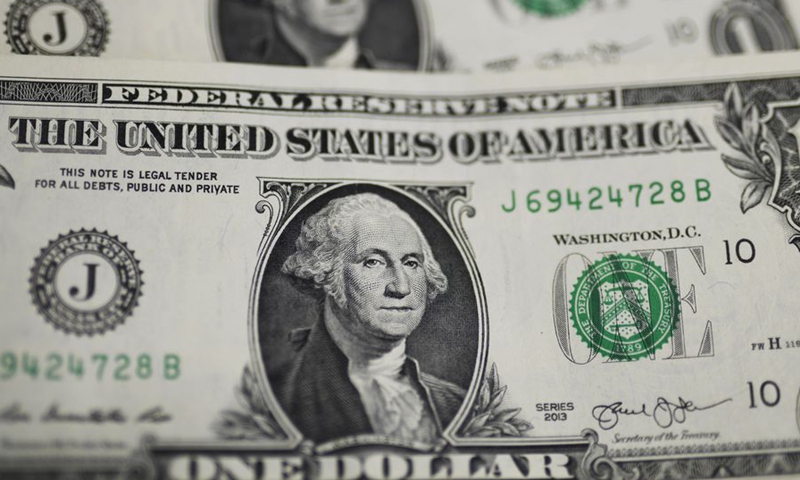
Photo taken on Sep 18, 2019 shows US dollar banknotes in Washington DC, the United States. File photo:Xinhua
The US economy contracted 3.5 percent in 2020 amid COVID-19 fallout, the largest annual decline of US gross domestic product (GDP) since 1946, according to data released by the US Commerce Department on Thursday.
The data also showed that the US economy grew at an annual rate of 4 percent in the fourth quarter of 2020 amid a surge in COVID-19 cases, slower than 33.4 percent in the previous quarter.
"The increase in fourth quarter GDP reflected both the continued economic recovery from the sharp declines earlier in the year and the ongoing impact of the COVID-19 pandemic, including new restrictions and closures that took effect in some areas of the United States," the department said in a statement.
Despite a partial economic rebound in the second half of last year, the US economy shrank 3.5 percent for the whole year of 2020, compared with an increase of 2.2 percent in 2019, according to the department.
"Over the past year, the economy contracted 10 percent in the first half of the year and made up three-quarters of that decline in the second half," Jason Furman, professor at Harvard University and former economic adviser to President Barack Obama, said on Twitter.
"Overall, the contraction in the economy was considerably smaller than projected earlier in the year and is likely much smaller than experienced in most other large advanced economies," Furman said.
The data came as the United States has recorded more than 25.6 million COVID-19 cases with over 430,000 related deaths as of Thursday morning, according to a tally from Johns Hopkins University.
Jay Bryson, chief economist at Wells Fargo Securities, said the spike in COVID-19 cases in the last two months of 2020 led to the re-imposition of restrictions in some states as well as voluntary social distancing practices by many individuals, which weighed on consumer spending.
"We currently project that real GDP in Q1-2021 will be more or less flat relative to the fourth quarter of last year," Bryson wrote Thursday in an analysis, adding the economic outlook over the next few quarters remains critically dependent on the path of the pandemic and the pace of vaccinations.
"Assuming that the pandemic does not spiral out of control in coming weeks and the deployment of vaccines continues to ramp up, the economy should fully re-open later this year," Bryson wrote.
